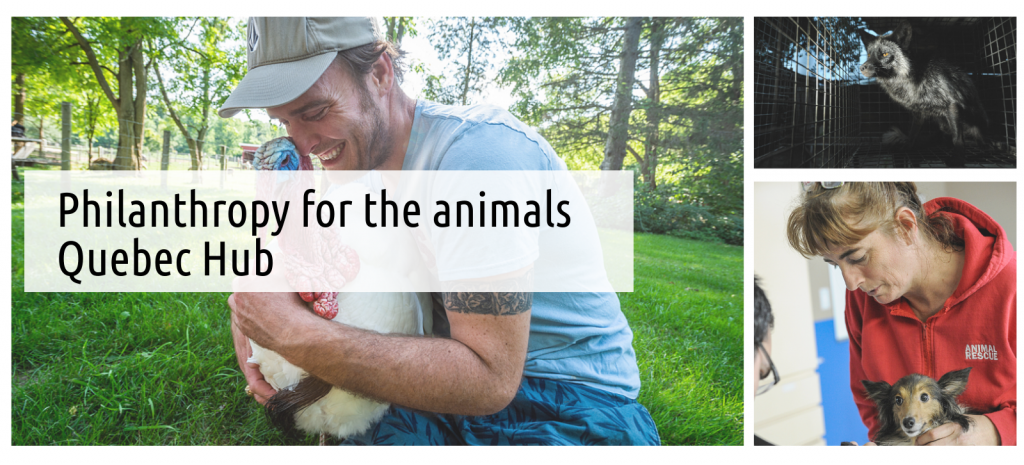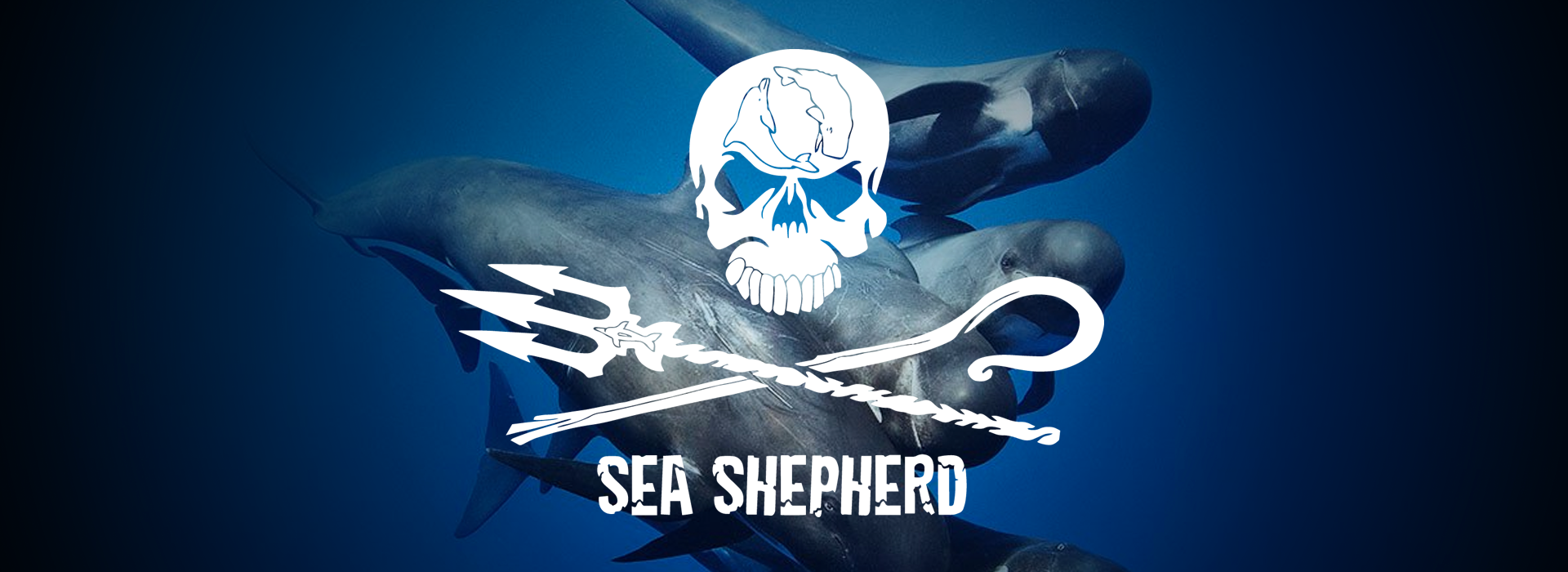
Photo Credit: Lewis Webster
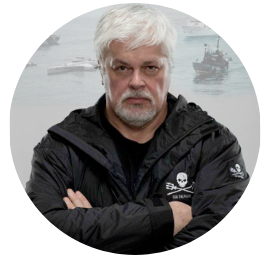
Paul Franklin Watson is an environmental activist, author, and reality TV star. Paul Watson is the founder of the Sea Shepherd Conservation Society (SSCS) and a pioneering, polarizing figure in the conservation movement. was a founding member of the environmental advocacy group Greenpeace, which formed in 1971 to protest American nuclear testing in Alaska. Watson is primarily known for his high-profile campaigns to protect marine life. He is the author of several books, including “Ocean Warrior: My Battle to End the Illegal Slaughter on the High Seas” (1994) and “Seal Wars: 25 Years on the Frontlines with the Harp Seals” (2002). He has won numerous awards, and in 2000, Time magazine named him one of the environmental heroes of the 20th century. He is married to Yana Rusinovich and has two children, Tiger and Murtagh.
Interview by Katherine Mac Donald
“If the Ocean Dies, We All Die” — Captain Paul Watson
Katherine Mac Donald (KM): Captain Paul Watson, could you start with a short introduction of how everything started with Sea Shepherd?
Paul Watson (PW): I was one of the founding directors of Greenpeace in 1972. I left Greenpeace in 1977 to set up Sea Shepherd, the reason being is that I felt that there was a need to take action and not just protest. I’m not really a protester. I set up Sea Shepherd to intervene primarily against illegal activities with a specific strategy of aggressive non-violence, meaning we’re going to aggressively intervene, but we’re not going to hurt anybody. After 45 years, we haven’t killed or hurt anybody, but we have shut down hundreds of illegal activities. We have driven the Japanese whalers out of the Southern Oceans where they were illegally killing whales and today, we have over 10 ships out on the ocean, with partnerships with numerous countries.
KM: What do these partnerships with countries entail?
It was quite a novel thing for an NGO to partner with various governments. It all started in Ecuador when we partnered with the Galapagos National Park to protect the Marine Reserve in 1999. Beginning in 2015, we really ramped up these types of partnerships after the 110-day pursuit of an ice-fish poacher called The Thunder, which is the longest pursuit of a poacher in maritime history. This got us involved with various countries and with Interpol. We’re now in partnerships with Liberia, Sierra Leone, Cape Verde, São Tomé and Príncipe, Namibia, Tanzania, Ghana, Gambia, Peru, Panama, and Mexico. We go into their waters with our resources, and they provide the authority for us to intervene. Beyond the two-hundred-mile limit, though, we operate under the principles of the United Nations World Charter for Nature, which allows for intervention to uphold international conservation law. That is what we’ve been doing for 45 years. Sea Shepherd is no longer an organization, it’s a global movement.
KM: How did you finance the purchase of the first Sea Shepherd ship?
PW: Two conservative organizations helped me out. One was Cleveland Amory’s Fund for Animals based in New York City. I had gone to Cleveland for help to oppose the killing of seals and he gave me $120,000 for the ship, which I found in England. Then, I didn’t have the money to operate it. I went to the RSPCA and they gave me a £15,000 donation. We ended up losing our first ship in a battle with a pirate whaler. I sold the movie rights to the story of the incident to Warner Brothers, which financed our second ship.
KM: Does Sea Shepherd mostly rely on volunteers from its member base for its general operations?
PW: Yes, we’ve always been a primarily volunteer-run organization. I’d say we’ve had 7000 volunteers over the years. At any given moment, there’ll be 250 volunteers on our ships, and others on onshore campaigns around the world. In the beginning, volunteers had to pay to come on board because otherwise, we couldn’t afford the fuel. I called it the Tom Sawyer approach. We don’t need to do that anymore. Volunteers are now only responsible for their travel to get to the ship and to get back, but they’re provided with room and board.
KM: Since 1977, have your tactics evolved from either a political or an action standpoint? Have you run into any specific conflicts that have led to these changes in strategy?
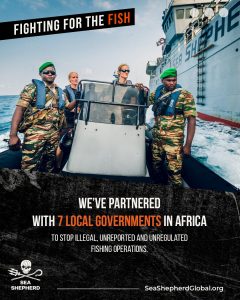
Source: SeaShepherd.org
PW: We haven’t changed other than the partnership program, which started with Ecuador and now exists with many other countries. However, direct intervention using aggressive nonviolence has been our main approach and that hasn’t really changed. Where we were once considered quite radical, we have become a bit mainstream. I believe it is because of the desperation on the part of governments and companies around the world. They see what is happening to the planet and they want to get involved. We are getting a lot more support from various companies and governments. Strangely enough, we were invited by John Kerry to join the American Security Council and we’re now having meetings with admirals. They teach our approach at the United States Naval War College because they’re looking for ways to deal with illegal fishing, which the military considers a threat to national security. The problem is that governments around the world have no experience in dealing with these issues. They put all their attention on drug intervention but put no effort into intervening against illegal fishing operations, which is becoming a major problem. We’re the only people that have been doing it, which is why they’ve been coming to us to see how we can work with them.
KM: With governments now asking you for advice, how does that fit in with the lawsuits Sea Shepherd has faced?
PW: The interesting thing is we’ve never been convicted of any felonies, and we’ve won every single lawsuit in the courts. I’ve always felt that the courtroom is an extension of our confrontations in the field, so you have to have a good understanding of the workings of the law. Ten years ago, I was invited to give a lecture to the FBI in Quantico, and one of the special agents here said, “You know, Sea Shepherd is walking a fine line when it’s come to the law.” And I said, “Does it really matter how fine that line is, as long as you don’t cross the line?” There might be a perception that we do, but we don’t cross that line. Of course, there are stories, with many people out there thinking we’re terrorists. I don’t really care if they believe that, because that makes our job easier. When we show up, poachers are scared to death of us. They see our Jolly Roger flag and think we’re going to torpedo them and send them all to the bottom. Of course, we’re not going to do that, but perception goes a long way towards getting things done.
KM: Do you feel the media has affected the impact of your different campaigns?
PW: We’ve always been good at understanding the nature of media. One of the reasons Greenpeace became so successful is that it was the first environmental organization to understand the power of the media. It’s no accident that Greenpeace was established by journalists, broadcasters, and communications majors. I was a communication major at the time at Simon Fraser University. I feel that you have to evolve with that changing media.
One of the things that really got Sea Shepherd going was back in 2006. I went to the different networks in the U.S. and said, “The biggest show on Discovery right now is a bunch of guys going into a cold, remote area to catch crabs. I can give you men and women going to a far colder, more remote, more hostile environment to save whales. It has to be more compelling than catching crabs every week.” Animal Planet went forward with it and The reason it isn’t there now is that we won the campaign, and the Japanese are no longer in the Southern Ocean killing whales.
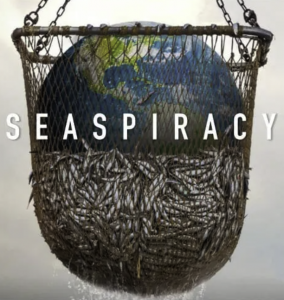 The television coverage from that show shot up our support base by 1000%. We took what was going on in Antarctica and put it in people’s living rooms around the world. Since then, we’ve been doing a lot of documentaries[1], including Sea of Shadows about the Vaquita campaign in the Gulf of California. The big one was Seaspiracy. It was successful because it’s a good documentary, but the medium is sometimes more important than the message it conveys. The fact that you can get onto a platform like Netflix will guarantee you reach many more people, especially the unconverted. The point of making these documentaries is to get them out to people who have never heard of you. That’s why Seaspiracy was so effective.
The television coverage from that show shot up our support base by 1000%. We took what was going on in Antarctica and put it in people’s living rooms around the world. Since then, we’ve been doing a lot of documentaries[1], including Sea of Shadows about the Vaquita campaign in the Gulf of California. The big one was Seaspiracy. It was successful because it’s a good documentary, but the medium is sometimes more important than the message it conveys. The fact that you can get onto a platform like Netflix will guarantee you reach many more people, especially the unconverted. The point of making these documentaries is to get them out to people who have never heard of you. That’s why Seaspiracy was so effective.
KM: Do these documentaries help fund the more direct actions as well as being education and awareness campaigns?
PW: Yes, they are educational, but also get many people who had never heard of Sea Shepherd to support or join us. We’ve always maintained our administrative overhead very low. We don’t have offices really, and we don’t have many highly paid administrators. Another thing we don’t do is fundraising like direct mail. We don’t spend money to raise money. That was something I decided to do when I set up Sea Shepherd. I want people to know that when they donate, it goes to the ships and the campaigns, we can tell them exactly what it’s being spent on. In contrast, let’s take Greenpeace as an example, which I can speak to as a founding director, brings in about €350M a year, and they spend about €70M to €80M on fundraising. We don’t bring in nearly as much, around $20M in total, but we don’t spend any money on fundraising to do it. What we’re able to achieve with that $20M is what they haven’t been able to do with their €350M. We have over 10 ships, they have three. They hardly do anything with their ships, whereas we do things all the time. Our strength lies in our volunteer base, money is not the motivating factor pushing Sea Shepherd campaigns to be successful. We’re doing something that is going to benefit the world and needs to be done. If people see what we’re doing, they’re going to volunteer and support us.
A big motivation for donors is that they can sponsor a ship. Our vessel Bob Barker is named so because Bob Barker gave us $5M. He originally didn’t want us to name the ship after him. When we told him that naming the ship after him would encourage other people to get involved, he accepted. Then Sam Simon, the creator of The Simpsons, gave us $3M to buy a ship, which is now the Sam Simon. Others joined in such as Dexter Silver, John Paul DeJoria, Paul Mitchell Shampoos, and Patron Tequila, Chris Sharp, Martin Sheen, etc [2]. These large corporate, capital investments go for the purchase of the ship. The actual running of the ships comes from small donations around the world.
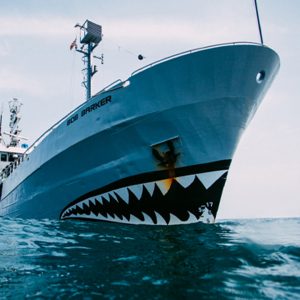
The Bob Barker. Source: SeaShepherd.org
KM: In Canada, Sea Shepherd currently lacks charitable status. Has that been a significant obstacle for the Sea Shepherd?
PW: We are actually getting our tax status back in Canada because of the law change of 2018. We had charitable status in Canada up until 1986, when somebody from Canada Revenue Agency came asked if we were opposed to the killing of wolves in Northern British Columbia and the seal hunt, which we were. They then asked if we were aware that the government respectively supports and subsidizes these activities, meaning our opposing them was an uncharitable activity. That’s why we lost our tax status in Canada. But in 2019, apparently, they changed the rules. It was a rather bizarre situation where a charity in Canada could not have tax status if the government disagreed with what they were doing.
However, every country is different. In Australia, we had to fight for eight years to get our tax status. Even with huge public support in Australia, the government has always been hostile there. In New Zealand, they denied Greenpeace that tax status, but gave it to us. We have a tax status in France, Germany, the UK, Italy, Austria, etc. They are all separate Sea Shepherd entities run by people in those countries.
KM: Since Sea Shepherd is an international movement, do the different chapters have their own regional strategies, or is there a global strategy?
PW: We do have an umbrella organization called Sea Shepherd Global, but they don’t have any money at all. They’re based in Amsterdam and all they do is independently coordinate the operations of the ships. The ships themselves aren’t linked to Sea Shepherd; each ship has its own charitable organization. It’s a liability issue. Let’s say a ship gets in trouble, they can sue the whole organization. The way it is right now, only the ship can be sued, not the organization that owns the ship, and the organization that owns the ship isn’t Sea Shepherd. This is a strategy the shipping industry has used for years.
KM: Are there any other specific struggles as a ship-based organization?
PW: Our biggest problem is acquiring skilled officers to run the ships. It is especially challenging because our ships are 100% vegan. Getting engineers, or the policing bodies that come on board in Africa for example, to sign on to that has been a bit of a struggle. I think it was in Gabon, where we had 12 soldiers come on board who wanted nothing to do with this vegan thing. We said “OK, you guys make your own stuff out on the deck and do whatever you want. But, if you want to eat vegan meals inside, you can.” Within two days, they were all eating inside, and they felt that the food was better inside. We found that the best way to get people to become vegan is to expose them to it, not to force them into it.
Another challenge is the constant new shipping rules and regulations. One of the latest challenges is that the registries want to have manning certificates for everyone on board, which severely cuts into our capacity to use volunteers effectively. The reason for this has nothing to do with us, but really has a lot to do with the refugee vessels in the Mediterranean. The problem is that these charitable organizations are picking up refugees, which the European governments don’t like. So, they make it harder for them to operate. It’s one thing to have the captain, the chief engineer, and the first officer having proper certification. But these new regulations are saying everybody must have proper certification: every deckhand and unskilled hand included. That forced us to run all our volunteers through courses in order to get their certification.
The regulations also change due to political pressure. To give you an idea, in 2011, there was a situation where we had to rescue a Norwegian vessel that had sunk in the McMurdo Sound in Antarctica. I had to fight our way through a bad storm. Not even the HMS Wellington New Zealand warship could make it through. But we made it and we did the search. Unfortunately, there were no survivors. We found the life raft and supplies and things like this, and we had to go to McMurdo and had a helicopter to refuel. We got a commendation from the New Zealand Rescue Coordination Center. Then, I get a letter from the New Zealand Foreign Minister reprimanding me for having gone on to Ross Island without having the proper permit, a permit that takes three months to get. My question was, how am I supposed to get a permit when your search and rescue has asked me to go in and find these people? Rather than thanking us for what we did, their response was: “because of that, we’re not going to fine you this time. But don’t do it again.” This is how some governments deal with these situations.
Then again, it’s interesting how people come around. In 2007-2008, Australian Environment Minister Ian Campbell was very hostile towards us and was completely against everything we were doing. In 2009, Ian Campbell is the director of Sea Shepherd Australia and our representative at the International Whaling Commission. He completely changed his mind and supported us instead of harassing us. One of our captains is a former chief of staff of the Italian Navy, a former admiral. We’re attracting a lot of people that you would not think would be involved in this kind of thing.
KM: The climate crisis has sparked dire predictions about our planet’s future. After nearly 50 years of direct action for our oceans, do you have any hope for the future of marine wildlife?
PW: I learned a lesson many years ago. I was a volunteer medic during the occupation of Wounded Knee in 1973[3]. We were surrounded. There were 1,500 federal troops shooting 20,000 rounds a night at us, 46 people were wounded, 2 were killed. I went to Russell Means and I said: “You know, we don’t have a hope in hell of winning here. We’re only 350 people. These guys have weapons, and tanks. Why are we here? We’re not going to do anything.” He looked at me, and he said something which has stayed with me all my life. He said:
“We’re not here because we’re worried about winning or losing. We’re not here because we’re concerned about the odds against us. We’re here because this is the right place to be, the right time to do it and the right thing to do. Don’t worry about the future. Concentrate on the present. What you do in the present will define what the future will be. ”
So, that’s what I do today. I don’t worry about the future. I concentrate on the present. We can’t control the future, but we can control the present.
The strength of the ecosystem lies in diversity. Therefore, the strength of any movement must also lie with diversity. It could be direct action, or it could be education. It doesn’t matter what you do or what your approach is, it could be litigation, legislation. Everybody’s efforts work towards the same end, and that’s where the strength of a movement lies. In many cases, we simply need to agree to disagree on tactics and approaches and just accept that we’re all contributing towards the same goal. I see more and more of that happening.
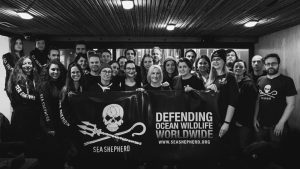
Sea Shepherd Montreal Chapter Crew
The big struggle right now, of course, is the climate crisis. I’m not sure that governments will do anything, for one because it’s basically political suicide. If any politician, prime minister, president or government tries to do something about it, they’re going to be tossed out because it’s going to cause unemployment, and corporations are going to be angry. If you go back in Canadian history, to the early 80s, all Prime Minister Joe Clark did was say that he felt Canadians should be paying the real cost of gasoline, that it shouldn’t be subsidized. Six months later, he’s no longer Prime Minister. Further, Justin Trudeau was the darling of the 2015 Climate Change Conference in Paris. He made many promises, but he went back and was just as bad as anybody else. The latest promise was to stop the cutting of old-growth forests by 2030. Very easy to say in 2021. By the time 2030 comes along, they won’t be in office. These promises don’t hold water.
KM: Would this be where the non-profit and philanthropic sectors can play a bigger role in supporting this work, for climate, and for the animals?
Absolutely, that’s what they should be doing! A few years ago, I looked at the province of British Columbia. There was a PR company called Burson-Marsteller. This same PR company represented government, corporations, and the media. It is the collusion of these three sectors that keeps us where we are. The problem isn’t fake news, it’s no news, missing information, those issues the media simply doesn’t cover. For instance, Standing Rock and the pipeline debate, or Fukushima, where they’re dumping radioactive water into the ocean. There are certain things that they decide that they’re not going to cover.
The only way we’re going to have any change is through non-government organizations and the passion, courage and imagination of individuals. There are only two solutions, we either find an answer or the answer will be delivered to us by Mother Nature, and it won’t be very pleasant. When people say it’s an impossible problem, I always say, the answer to an impossible problem is to find the impossible solution. How you do that? Through passion, courage, and imagination. The very idea in 1972 that Nelson Mandela would be president of South Africa was unthinkable. It was impossible. And yet the impossible became possible. I think that holds true for a lot of things. So that gives me hope.
KM: Thank you so much Paul for taking the time to share your incredible stories and insights on how we, as a sector, and as a society, can work towards a healthy ocean, and a healthy planet.
Sea Shepherd Global: https://www.seashepherdglobal.org
Sea Shepherd: https://seashepherd.org
Listen to the podcast here:
 A special thank you to Annik Boivin for building bridges between the Kanien’kehá:ka Nation, PhiLab, and Captain Paul Watson.
A special thank you to Annik Boivin for building bridges between the Kanien’kehá:ka Nation, PhiLab, and Captain Paul Watson.
On June 18th 2007, Sea Shepherd Founder and President Captain Paul Watson attended a special gathering organized by the Traditional Longhouse in Kahnawake just south of Montreal. The gathering was organized for the purpose of presenting the registry and the flag of the Five Nations to the Sea Shepherd Conservation Society for the ships Robert Hunter and Farley Mowat. Nation to Nation, a Symbol of Solidarity.
Click here to learn more.
This article is part of the special edition of January 2022 : Philanthropy for the Animals. You can find more information here